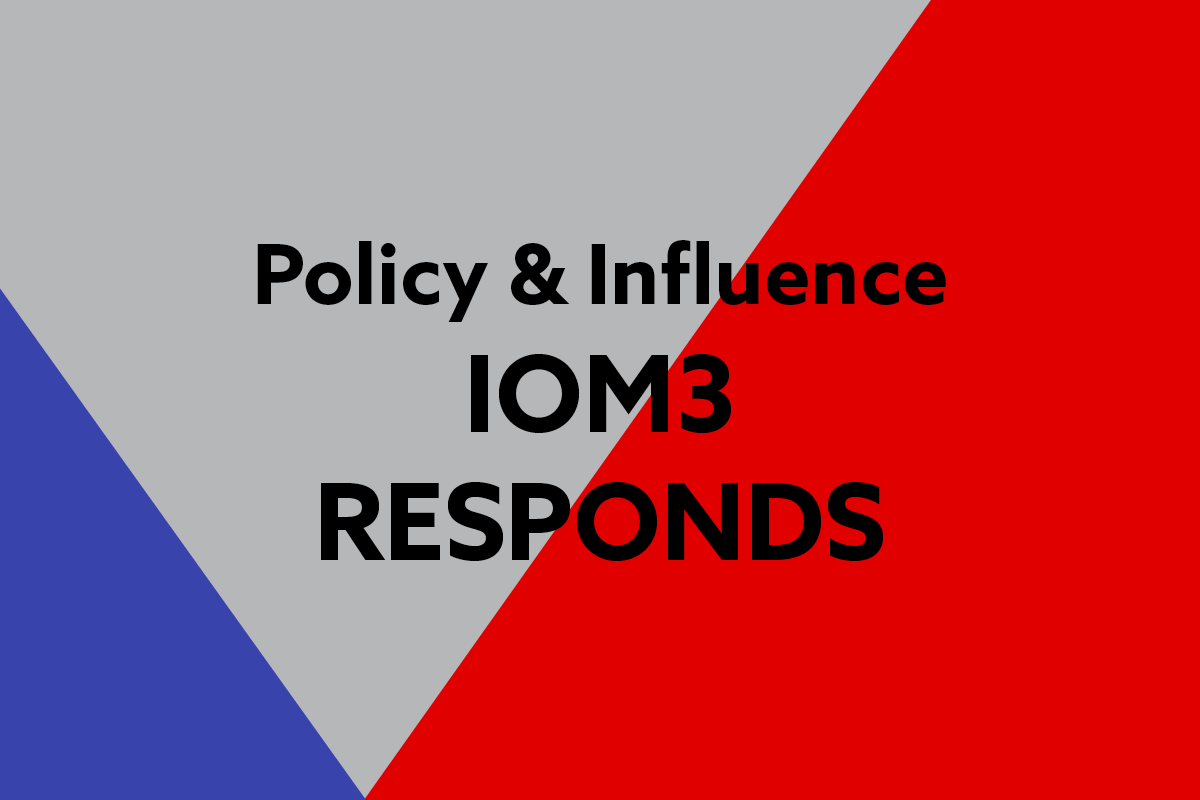IOM3 responds to National Infrastructure Assessment
The National Infrastructure Commission has published its second National Infrastructure Assessment (NIA2) recommendations to government.

NIA2 advises government on the infrastructure needs over the next 30 years to meet the strategic challenges of:
- Decarbonising energy and achieving net-zero emissions
- Supporting economic growth across all regions and
- Improving climate resilience and the environment.
The five yearly review sets out nearly 50 recommendations across transport, energy, water and wastewater, flood resilience, digital connectivity, and solid waste. Key recommendations relevant to IOM3 members include:
Energy and reaching net-zero
- Accelerate deployment of offshore wind, onshore wind and solar power generation, with significant levels of system flexibility
- Electrification as the only viable option for decarbonising buildings at scale
- A switch to electrified heat by incentivising the rollout of heat pumps and heat networks at pace to replace gas boilers in homes and businesses
- Install energy efficiency measures
- Rule out the use of hydrogen for heating and focus hydrogen on power generation and industrial decarbonisation
- Continue the rollout of electric vehicles and the charging infrastructure to support their use
- Policy to actively encourage industrial decarbonisation at speed
- A core network for carbon pipelines and storage
- A core network for hydrogen pipelines and storage
Growth across all regions
- Major public transport upgrades in England’s most congested cities
- Devolution of powers and funding to local authorities responsible for strategic transport
- Encourage a modal shift for city transport and travel – make long term funding conditional on introduction of demand management schemes
- A national strategy for road and rail transport to identify strategic improvements
- Maintain existing road and rail networks by investing in maintenance and renewal
- Set out plans for how digital technology can help meet the future needs of infrastructure sectors
Improving resilience and the environment
- Clear resilience standards for infrastructure sectors and better maintenance practices
- Ask infrastructure operators to estimate the cost of maintaining resilience standards in the face of projected climate change to 2050
- Work with the relevant standards bodies to ensure technical engineering standards factor in future climate change
- Without further delay, implement and provide clear guidance on how the packaging and collection reforms ‘simpler recycling’, extended producer responsibility and deposit return scheme will work
- Develop individual recycling targets for all local authorities and provide financial support for transitional costs
- Expand the single use plastics ban to cover a wider range of hard to recycle plastic items
- Introduce a measurement system on the composition and waste treatment destinations for commercial and industrial waste in England
- Create stronger incentives for investment in the recycling infrastructure that will be needed in the future
- Ban new energy from waste capacity that does not include carbon capture and storage
Making good decisions, fast
- Introduce a data sharing platform for environmental data with clear data standards
- Change the major projects planning system to shorten timelines
- Embed design principles throughout a project lifecycle
The report highlights the need for significant public and private investment in infrastructure and outlines a new approach needed in the face of global competition including:
- Policy stability
- Pro-investment regulation
- Speeding up the planning system for major projects
It also notes that delivering the proposals relies on an adequate skills base in the UK. It highlights the very real risk that skills shortages and lack of supply chain capacity will deter some investments, push up the costs and delay the delivery of infrastructure projects. It states that long term policy certainty is a prerequisite for building effective skills and supply chains.
Commenting on the NIA2, IOM3 CEO Dr Church CEnv FIMMM said 'It is good to see key points IOM3 has been making reflected in today’s report including the need for industrial decarbonisation to be supported, packaging policy reforms to be implemented, a better understanding of commercial and industrial waste, energy efficiency measures implemented and long term policy stability.
If government takes up these recommendations alongside steps to ensure a skilled and sustainable workforce, this will represent significant progress towards a low-carbon, resilient and resource efficient society.'
Government is expected to respond formally to the Assessment within 12 months.

